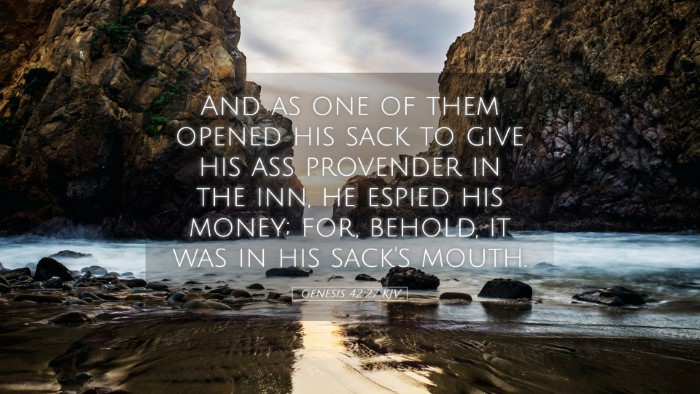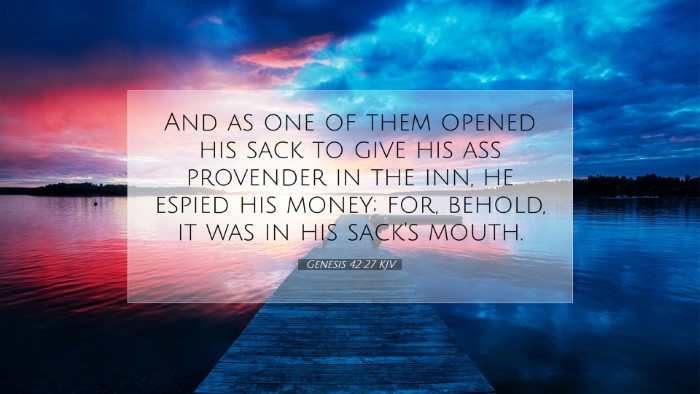Genesis 42:27 Commentary
Verse Summary: Genesis 42:27 states, "And as one of them opened his sack to give his ass provender in the inn, he espied his money; for, behold, it was in the mouth of his sack." This moment occurs during the brothers' journey back to Jacob after purchasing grain in Egypt, unaware that they have encountered their brother Joseph, who is now governor of Egypt.
Introduction to the Context
In the broader context of Genesis 42, the narrative follows the sons of Jacob who travel to Egypt to buy grain due to a severe famine. Joseph, having been sold into slavery by his brothers, is now in a position of power. This situation sets the stage for the unfolding dynamics of familial betrayal, repentance, and eventual reconciliation.
Insights from Public Domain Commentaries
Matthew Henry's Commentary
Recognition of Their Sin: Matthew Henry emphasizes the providential hand of God in allowing the brothers to find their money. He notes that this discovery serves as a reminder of their guilt regarding Joseph, suggesting that it was a divine means to awaken their consciences regarding their past actions. The brothers had previously conspired against Joseph, and now they face consequences that bring their sin to the forefront.
Fear and Anxiety: Henry further elaborates on the psychological state of the brothers. When they find the money, they are filled with fear, thinking that they may have been set up to be accused of theft. This fear illustrates their internal guilt and how it manifests through their suspicion of others. Henry points out that even in their attempts to live righteously by seeking to buy grain for their family, they are haunted by their past misdeeds.
Albert Barnes' Notes on the Bible
The Symbol of Their Guilt: Albert Barnes notes that the finding of the money in the sack indicates not merely a logistical mistake but rather acts as a symbol of their guilt and God’s sovereignty. It is seen as a token of how God can use even the outcomes of human actions to fulfill His greater purpose. The brothers thought they could escape their past, yet the reality of their actions resurfaces.
Implications of Divine Providence: Barnes highlights the underlying theme of divine providence in this episode. The return of their money can be interpreted as God's way of stirring a sense of unease within the brothers that would ultimately lead to a period of reflection and remorse. Consequently, it signals the beginning of their transformation, paving the way for their future redemption.
Adam Clarke's Commentary
Historical Context and Dual Perspectives: Adam Clarke provides a deeper historical context for this passage. He discusses the economic conditions leading to the brothers’ journey to Egypt, underscoring the desperation that characterized their need for sustenance. Clarke also mentions the dual perspective of Joseph and his brothers, where Joseph is orchestrating the events to elicit a genuine change in his brothers' hearts.
The Role of Conscience: Clarke emphasizes the role of conscience in human dealings, indicating that the discovery of the money acts as a catalyst for the brothers to confront their guilt. This confrontation serves as a pivotal point not only for their character development but also in laying the groundwork for the narrative of reconciliation that follows later in Genesis.
Theological Themes
- Guilt and Repentance: Genesis 42:27 sheds light on the themes of guilt and the necessity of repentance. The brothers' reaction to finding the money signifies an acknowledgment of their wrongdoing.
- Divine Providence: This verse highlights how God orchestrates events in the lives of His people, often using challenging circumstances to lead them toward greater self-awareness and change.
- Restoration and Redemption: While the brothers experience fear and dread, it foreshadows the eventual path toward restoration with Joseph and their family, reflecting God's overarching plan for redemption.
Applications for Today's Believers
This passage encourages modern readers to reflect on their own lives and consider how past actions resonate in the present. It calls for a conscious engagement with one’s conscience and a willingness to face the consequences of sin honestly.
Learning from the Past: Just as the brothers were forced to reckon with their past, believers today are invited to learn from their missteps, fostering a spirit of humility and repentance.
Trusting in God's Plan: The profound lesson of divine providence illustrated in this passage reassures believers that God is at work in every situation, even when challenges arise. It serves as a reminder to trust that God's plans are ultimately for good, even when we do not initially understand them.
Embracing Forgiveness: The journey of Joseph and his brothers culminates in forgiveness, underscoring the importance of reconciling relationships. This encourages believers to pursue forgiveness and restoration in their own relationships.


